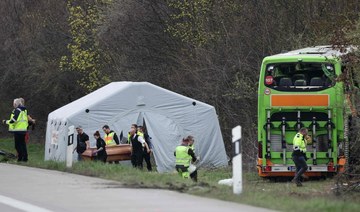BARCELONA: Fears are growing that disagreements between rich and poor nations over how to manage a new fund to tackle the “loss and damage” caused by wilder weather and rising seas could throw the COP28 UN climate summit in Dubai into disarray.
A “transitional committee” working out the details of the fund — which countries agreed to set up at last year’s COP27 climate conference — failed in Egypt late last week to issue a set of recommendations on how to get it up and running, after clashing over whether it should be hosted by the World Bank.
Developed countries, led by the United States, are pushing for the fund to be based at the bank, while developing nations argue this would tip the balance of power toward wealthy governments and make it hard for them to tap into the funding.
The G77 and China group of developing countries would prefer an independent loss and damage fund that can set its own rules, or one housed at a UN agency.
G77 chair Pedro Luis Pedroso Cuesta of Cuba told journalists last week that the fund’s administrative arrangements should not prevent all climate-vulnerable developing nations from accessing it directly nor stop it from accepting broad sources of finance.
“It has been demonstrated that the World Bank is not the institution that can best... comply with what we are looking for for this fund,” he said, adding that until recently the bank had lacked a “climate culture.”
The 24-member transitional committee is now set to meet again in Abu Dhabi in early November, in a last-ditch attempt to find compromise and craft a joint proposal for countries to finalize and adopt at COP28, starting on Nov. 30.
The recommendations will also include guidance on which countries can tap into the fund — and how — as well as the different sources of finance it could draw from.
“The eyes of the world are on you to deliver clear, clean and strong recommendations ahead of COP28 to operationalize the Loss & Damage Fund (and) funding arrangements,” Sultan Al-Jaber, COP28 president for the United Arab Emirates, said in a statement to the committee after the latest meeting.
He stressed that billions of people vulnerable to climate change impacts depend on the successful delivery of the recommendations. He also called for early pledges to the fund.
Loss and damage has long been a contentious issue in the UN climate talks, as wealthy nations for years rejected demands for “compensation” for the effects of their high share of the planet-heating emissions that are turbo-charging floods, droughts and storms around the world.
But at COP27 last November, a group of 134 African, Asian and Latin American states and small island nations finally won global agreement to set up the new fund that will pay to repair devastated property, move threatened communities or preserve cultural heritage before it vanishes.
Calls for climate solidarity
Climate justice campaigners and policy experts sounded the alarm that the fractious discussions could hamstring the broader effort at COP28 for faster progress on cutting emissions and dealing with the worsening impacts of global warming.
“We are destined for very rocky negotiations in Dubai” if the final committee meeting in Abu Dhabi fails, warned Preety Bhandari, senior adviser in the Global Climate Program and the Finance Center at the US-based World Resources Institute.
“The entire COP28 negotiations could get derailed if developing countries’ priorities on funding for loss and damage are not adequately addressed,” she added.
Brandon Wu, director of policy and campaigns at ActionAid USA, said the United States had argued in Egypt it has no particular responsibility to pay for climate loss and damage despite being the world’s largest historical emitter of greenhouse gases.
It had refused to budge on its proposal for the World Bank to host the fund, he added.
“We need a spirit of solidarity and cooperation from the world’s rich countries that have been the primary cause of the climate crisis. The least they can do is listen to what developing countries need from a Loss & Damage Fund, and design the fund with those needs in mind,” said Wu.
The US government’s top representative at the committee meeting, Christina Chan, was cited by the Financial Times last week as saying it was wrong to suggest her country was standing in the way of progress on the fund. She said Washington was willing to address concerns and solve problems.
A set of draft recommendations — which were not adopted at the meeting — included four options for where the fund could be located, including a limited initial stint at the World Bank with a list of conditions to assuage worries about the balance of control and which countries can tap into it.
Small island states and middle-income developing countries like Pakistan are worried they may not be eligible for payouts, as they are not among the world’s poorest nations, despite suffering huge losses in recent years from storms and floods.
During the meeting, the chair of the Alliance of Small Island States (AOSIS), Diann Black-Layne of Antigua and Barbuda, noted the World Bank is a lending institution, while dealing with loss and damage in debt-strapped nations like hers requires grant funding.
She also criticized the bank for being slow, inefficient and charging high fees to funds it hosts.
The World Bank issued a note clarifying its charges, which it said had been “mischaracterized,” and also indicated it would be willing to tweak its procedures to allow countries to directly access loss and damage funding rather than going through intermediaries.
The bank this month updated its mission “to create a world free of poverty – on a livable planet” and its president Ajay Banga has sought to dispel concerns about the bank’s commitment to tackling climate change under its former leadership.
Saber Hossain Chowdhury, the Bangladesh prime minister’s special envoy for climate change, told the Thomson Reuters Foundation that putting money on the table and making the fund operational would be a litmus test for COP28.
Instead of focusing on who should host the fund, “it is more important that the institution (in charge) should be independent in terms of how that fund is managed, and how the money is disbursed,” he said in an interview last week.


























